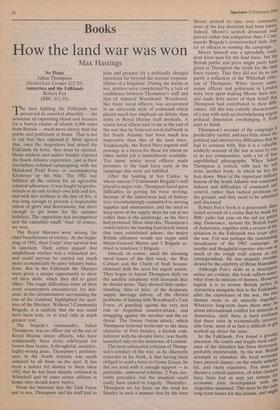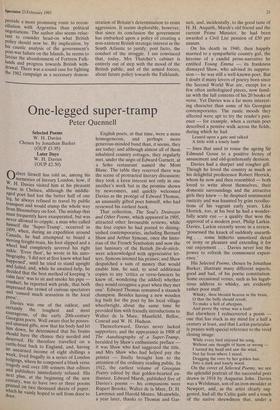Books
How the land war was won
Max Hastings
The men fighting the Falklands war perceived its essential absurdity — the nonsense of expending blood and treasure for a barren cluster of islands 8,000 miles from Britain — much more clearly than the public and politicians at home. That is not to say that they opposed it. Most agreed that, once the Argentines had seized the Falklands by force, they must be ejected. Many soldiers and sailors frankly enjoyed the South Atlantic experience, just as their forefathers relished campaigning with the Malakand Field Force or accompanying Kitchener' up the Nile. The 1982 war fulfilled all the criteria for an agreeable colonial adventure: it was fought by profes- sionals at no risk to their own kith and kin, and with few civilians in the line of fire; it was long enough to provide a respectable ration of glory and decorations, but short enough to get home for the summer holidays. The opposition was incompetent and the casualties small. And, of course, we won.
The Royal Marines were among the chief beneficiaries of victory. At the begin- ning of 1982, their Corps' very survival was in question. Their critics argued that amphibious warfare was a redundant art, and could anyway be carried out much more economically by army infantry batta- lions. But in the Falklands the Marines were given a unique opportunity to show off their skills, which they did to great effect. The tragic difficulties some of their army counterparts encountered, for inst- ance, in the circumstances surrounding the loss of the Galahad, highlighted the qual- ities of the Marines. Without 3 Commando Brigade, it is unlikely that the war could have been • won, or at least only at much greater cost.
The brigade's commander, Julian Thompson, was an officer out of the run of Royal Marine senior officers, who have traditionally been more celebrated for brawn than brains. A thoughtful, sensitive, highly-strung ran, Thompson's perform- ance in the South Atlantic was much admired by all those on the spot. It has been a matter for dismay to them since 1982 that he has been sharply criticised in Whitehall and by some senior officers at home who should know better.
From the moment that the Task Force • put to sea, Thompson and his staff had to plan and prepare for a politically charged operation far beyond the normal responsi- bilities of a brigadier. During the weeks at sea, matters were complicated by a lack of confidence between Thompson's staff and that of Admiral Woodward. Woodward, like many naval officers, was accustomed to an autocratic style of command which placed much less emphasis on debate than army or Royal Marine staff methods. A senior naval officer said to me at the end of the war that he believed naval staffwork in the South Atlantic had been much less impressive than that of the land force. Traditionally, the Royal Navy regards staff postings as a haven for those for whom no other useful job is immediately available. Too many senior naval officers made promises to the land force early in the campaign that were not fulfilled.
After the landing at San Carlos, in whose success 3 Commando Brigade's staff played a major role, Thompson faced great difficulties in getting his force moving, because of the unforeseen lack of helcop- ters, overwhelmingly committed to moving supplies and ammunition, and the need to keep most of the supply ships far out at sea rather than in the anchorage, as the Navy had promised. More than this, Thompson's orders before the landing had clearly stated that once established ashore, the major British offensive would not begin until Major-General Moore and 5 Brigade ar- rived to reinforce 3 Brigade.
Instead, of course, amid the alarming naval losses of the first week, the War Cabinet and the Chiefs of Staff became obsessed with the need for urgent action. They began to harass Thompson daily on the satellite telephone with demands that he should move. They showed little under- standing, then or later, of the desperate supply shortage ashore, of the chronic' problems of liaising with Woodward's Task Force, of guarding against the very real risk of Argentine counter-attack, and struggling against the weather and the air threat. The Goose Green attack, which Thompson believed irrelevant to the main objective of Port Stanley, a foolish com- mitment with his slender force, was finally launched only on the insistence of London.
The most substantial criticism of Thomp- son's conduct of the war, as he discreetly concedes in his book, is that having been obliged to send a force to Goose Green, he did not send with it enough support — in particular, armoured vehicles. 2 Para nar- rowly prevailed, but the situation could easily have ended in tragedy. Thereafter, Thompson set his force on the road for Stanley in such a manner that by the time
Moore arrived to take over command, most of the key decisions had been taken. Indeed, Moore's scratch divisional staff proved rather less competent than 3 Com- mando Brigade's overstretched little clus- ter of officers in running the campaign. Moore himself was a splendidly confi- dent front man for the land force, but the British public and press might justly have given to Thompson the credit for the land force victory. That they did not 'do so was partly a reflection of the Whitehall critic- ism of Thompson. When victory came, senior officers and politicians in London were bent upon making Moore their star, and made little secret of their belief that Thompson had contributed to their diffi- culties. All this was entirely characteristic of a war with such an overwhelming urgent political dimension overhanging it from start to finish. Thompson's account of the campaign is predictably tactful, and says little about the political and interservice difficulties that he had to contend with. But it is a valuable soldierly account of the war as seen by one of its key commanders, with a lot of fine unpublished photographs. When Julian Thompson is retired, with luck he will write another book, in which he lets his hair down. Most of the important military lessons of the South Atlantic war concerned, failures and difficulties of command and control, rather than tactical problems on the ground, and they need to be admitted and discussed.
Robert Fox's book is a generously illus- trated account of a cruise that he made for BBC radio last year on the old ice patrol ship Endurance, around the British bases of Antarctica, together with a review of the situation in the Falklands two yeirs after the war. Fox was perhaps the outstanding broadcaster of the 1982 campaign, all acerbic and thoughtful reporter who saw as much of the rough stuff ashore as anY correspondent. He was unjustly oversha- dowed by the celebrity of Brian Hanrahan. Although Fox's skills as a descriptive writer are evident, this book suffers some- what from its mixture of themes. However logical it is to review British policy un Antarctica alongside that in the Falklands, after the experience of the war, the two themes seem to sit uneasily together. Whatever long-term fears there may be about international conflict for minerals in Antarctica, until there is hard evidence that these exist in economically recover- able form, most of us find it difficult to get worked up about the issue. In the Falklands, Fox found a gloontY situation: the lonely and fragile rural exist- ence of the islanders has been destroyed' probably irretrievably, by the war. British attempts to stimulate the local economy have proved clumsy, on the whole unhelP: ful, and vastly expensive. Fox does n°` discuss a critical question, of what chances have been lost or may yet remain f°r economic joint development with the Argentine mainland. This must be the only long-term future for the islands, and might provide a more promising route to recon- ciliation with Argentina than political negotiations. The author also seems reluc- tant to consider head-on what British policy should now be. By implication, by his caustic analysis of the government's post-war failure on the Islands, he seems to favour the abandonment of Fortress Falk- lands and progress towards British with- drawal. There was a sound case for fighting the 1982 campaign as a necessary demon- stration of Britain's determination to resist aggression. It seems deplorable, however, that since its conclusion the government has embarked upon a policy of creating a non-existent British strategic interest in the South Atlantic to justify, post facto, the conduct of the struggle. I am convinced that, today, Mrs Thatcher's cabinet is entirely out of step with the mood of the British public, and of the armed forces, about future policy towards the Falklands.











































 Previous page
Previous page